Support For Marijuana Legalization Hits Another High Ahead Of Midterms
Just over a week before two states will be voting on referendums to legalize recreational marijuana, a new poll finds that two-thirds of Americans support legalization.

Another new poll shows support for marijuana legalization hitting an all-time high as we stand just two weeks away from a mid-term election in which voters in two states could legalize recreational marijuana and voters in others could liberalize their state’s laws regarding the use of marijuana for medical purposes:
Two-thirds of Americans support legalizing marijuana, according to a Gallup survey released Monday, marking an all-time high level of support in nearly 50 years of polling on the issue.
Monday’s poll found that 66 percent of Americans support legal pot, up slightly from 64 percent a year ago.
A majority of both major parties support legalization, including 75 percent of Democrats and 53 percent of Republicans. Both numbers ticked up slightly compared to a year ago.
Among independents, 71 percent support legalization.
Support for legal weed among Americans age 55 and older has risen substantially in the last year, up from 50 percent to 59 percent.
The poll was conducted Oct. 1-10 among 1,019 adults and has a margin of error of 4 percentage points.
This poll comes roughly two weeks after a new poll from the Pew Research Center found support for legal marijuana at similarly high levels, and several months after a Quinnipiac poll that found the same result. It also comes just about a week after recreational use and possession of marijuana became legal in Canada, making that country the second in the world to make cannabis legal nationwide and fulfilling a campaign promise that Prime Minister Justin Trudeau had made during the General Election in 2015. Among all these numbers, perhaps the most interesting thing about all of this polls, and this Gallup poll specifically is the fact that we’re now at the point where every significant demographic group supports legalization, although support is somewhat more muted among some groups, such as Republicans and older Americans than it is among others. Nonetheless, as these charts show, the trend has been for support for legalization to increase, slowly but surely across the board.
This first chart, for example, shows how public opinion as a whole has changed over the years since Gallup has been asking the question:
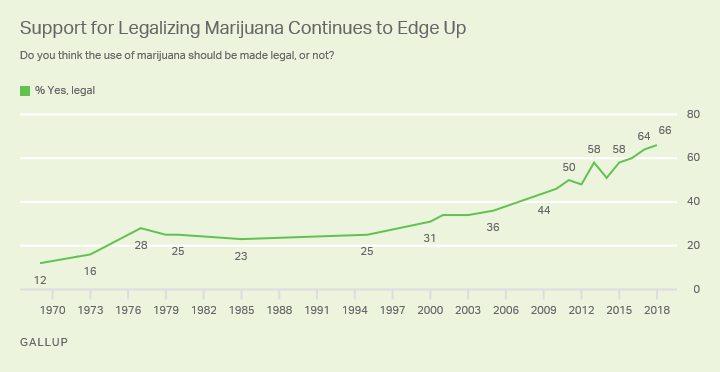
This second one shows the breakdown of the above charge based on political party, and shows that all three self-identified political identities:
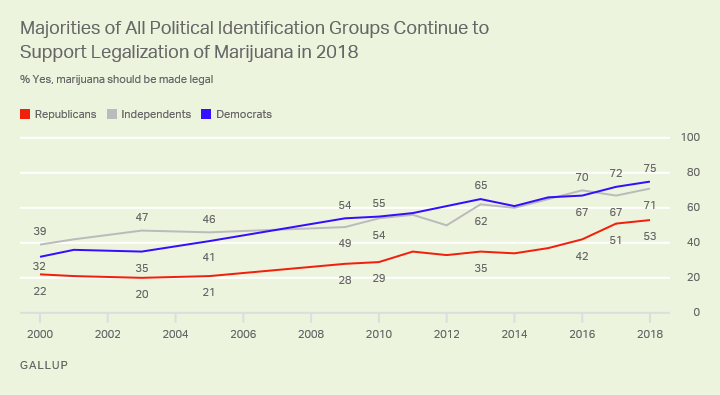
And, finally, here’s the breakdown by age, which shows not unexpectedly that support for legalization is highest among younger age groups, but it also shows that even the oldest Americans, who tend to be the last adopters when it comes to changes in social attitudes, are now at the point where a majority supports legalization:
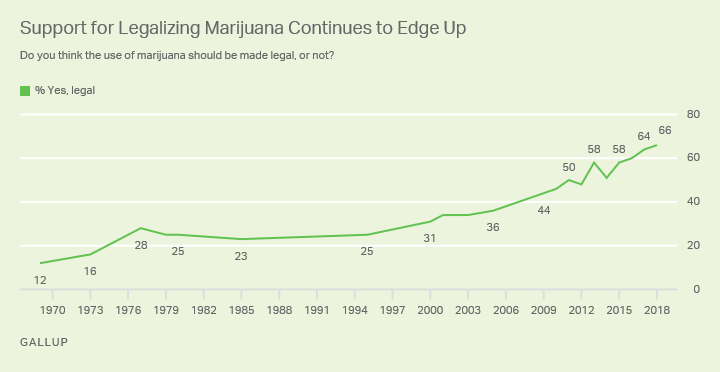
This latest poll continues a trend that began at the beginning of the decade, has continued unimpeded for the past seven years, and which shows no signs of stopping or reversing itself any time soon. In 2011, for example, polling showed that support legalization had reached the 50% level, while even larger numbers supported legalization supported legalization for medical purposes or decriminalization. By 2013, the number of Americans supporting legalization had passed the 50% mark. That mark reached 55% in 2014 and 58% in 2015. By this time last year, polling showed that support for legalization had reached 64% and a poll taken five months ago showed support at 63%. So, we’ve basically reached the point where two-thirds of the American public supports complete legalization and, according to this newest poll and other polls upwards of 90% of Americans support legalization of marijuana
As these poll numbers have increased, the movement toward liberalization of marijuana laws and outright legalization has moved steadily forward. It began to gain steam, of course, in 2010 when Colorado and Washington both passed citizen referenda legalizing cannabis. Four years later similar measures passed in Oregon, Alaska, and the District of Columbia. Most recently marijuana was legalized in 2016 in California, Massachusetts, Nevada, and Maine via citizen referenda and voters in a number of other states approved legalization for medicinal purposes. Even though we’re only four months in 2018 has seen several advances in this area. For example, January was the biggest month yet for the legalization movement given the fact that the most populated state in the nation, California, officially legalized marijuana based on the aforementioned 2016 referendum. Additionally, Vermont became the first state to legalize marijuana through the legislature instead of a voter referendum. New Jersey stands likely to be the second state where that happens thanks to the election of a Democratic Governor who supports legalization a Democratic state legislature that spent eight years trying to liberalize drug laws in the Garden State only to be thwarted by the veto of former Governor Chris Christie. Governor Murphy has already taken steps to use his regulatory powers to expand access to the state’s medical marijuana program. Additionally, earlier this summer, in anticipation of the passage of a bill that would legalize marijuana by the state legislature, the New Jersey Attorney General announced that marijuana prosecutions would be put on hold. Finally, in less than two weeks Michigan and North Dakota will be voting on full legalization in November and several other states will be voting on legalization for medical use.
As I’ve said before, all of this mirrors the manner in which we’ve seen another recent change in social attitudes have an impact on the law:
[T]here are unmistakable similarities between the tend that we’ve seen in polling on this issue and the trend that we saw in the polling on the issue of marriage equality in the years before the Supreme Court’s decision in Obergefell v. Hodges.In both cases, the change seems to be rooted in changes in society and culture that have recognized that previous attitudes were based on incomplete information or biases that had no basis in fact. In some sense, the change in public opinion on marijuana legalization has been even more radical than the changes we saw with respect to marriage equality in that it has occurred over a much shorter period of time. The noticeable difference, of course, is that this increase in support for legalization has not led to the same rapid changes in the law that we saw with the marriage equality issue. To a large degree, though, this is because most of the progress with regard to same-sex marriage was made via the Court system rather than the legislative process or citizen referendums. For many reasons, the court system is not well suited to deal with the marijuana legalization, though, and the efforts that have been made have been largely unsuccessful. For example, last year a group of Plaintiffs in New York attempted to get a Federal Court to declare the scheduling of marijuana as a Schedule 1 drug by the Drug Enforcement Administration invalid, but that effort was dismissed. Instead, the progress on marijuana legalization has had to take the slower route of using the legislative and political process to change the law. Those routes generally operate at a much slower pace than the court system does, and often be blocked by a determined minority of voters. Despite this slower pace, though, the trend toward more liberal marijuana laws and eventually nationwide legalization, seems to be fairly clear. At this point, it’s not a matter of if, but when.
These latest developments are just another step down that road.



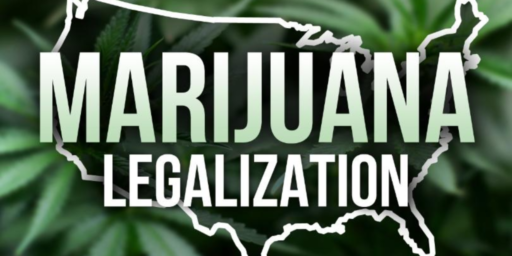

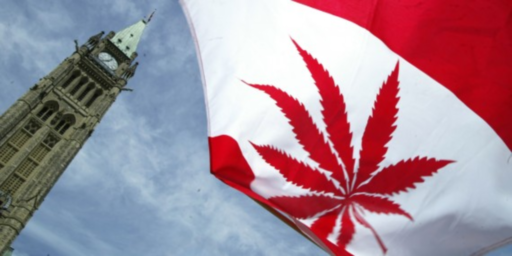
Another HIGH…I see what you did there…
Quick correction Doug–we are just over one week away from the mid-terms, not two.
Interesting case beginning in Colorado. Neighboring landowner objects to a marijuana grow project and is suing using RICO because marijuana is illegal under federal law.Anyone found civilly liable under RICO must pay out three times the amount of damages — such as a loss in property value — that a jury finds. And, so, if the lawsuit is successful, it could create a plan for how to dismantle the Colorado marijuana industry, brick-by-brick: Find someone whose property value was hurt by a marijuana business and then use RICO to sue that business out of existence. https://coloradosun.com/2018/10/29/colorado-marijuana-lawsuit-safe-streets-rico/
Marijuana consumers deserve and demand equal rights and protections under our laws that are currently afforded to the drinkers of far more dangerous and deadly, yet perfectly legal, widely accepted, endlessly advertised and even glorified as an All-American pastime, alcohol.
Plain and simple!
The “War on Marijuana” has been a complete and utter failure. It is the largest component of the broader yet equally unsuccessful “War on Drugs” that has cost our country over a trillion dollars.
Instead of The United States wasting Billions upon Billions more of our tax dollars fighting a never ending “War on Marijuana”, lets generate Billions of dollars, and improve the deficit instead. It’s a no brainer.
The Prohibition of Marijuana has also ruined the lives of many of our loved ones. In numbers greater than any other nation, our loved ones are being sent to jail and are being given permanent criminal records which ruin their chances of employment for the rest of their lives, and for what reason?
Marijuana is much safer to consume than alcohol. Yet do we lock people up for choosing to drink?
Let’s end this hypocrisy now!
The government should never attempt to legislate morality by creating victim-less marijuana “crimes” because it simply does not work and costs the taxpayers a fortune.
Marijuana Legalization Nationwide is an inevitable reality that’s approaching much sooner than prohibitionists think and there is nothing they can do to stop it!
Legalize Nationwide! Support Each and Every Marijuana Legalization Initiative!
Your third graph is a repeat of your first graph. I can only assume that you were high while writing this post.
Missouri has 3 medical marijuana ballot measures this year. 2 Amendments and 1 proposition. Amendment 2:
Amendment 3:
Proposition C:
I like Amendment 2 the best, mostly because it allows one to grow one’s own medicine. One can vote for all 3 but Amendment 3 looks like an exercise in ratfckery to me with egregious taxes and the invention of a whole new and absolutely unneeded bureaucracy so I’m not voting in favor of that one.